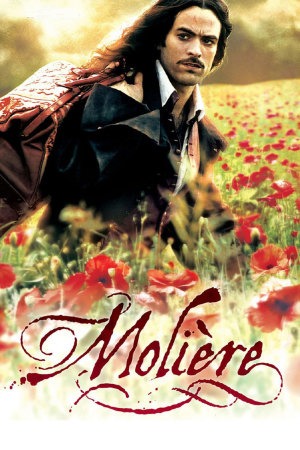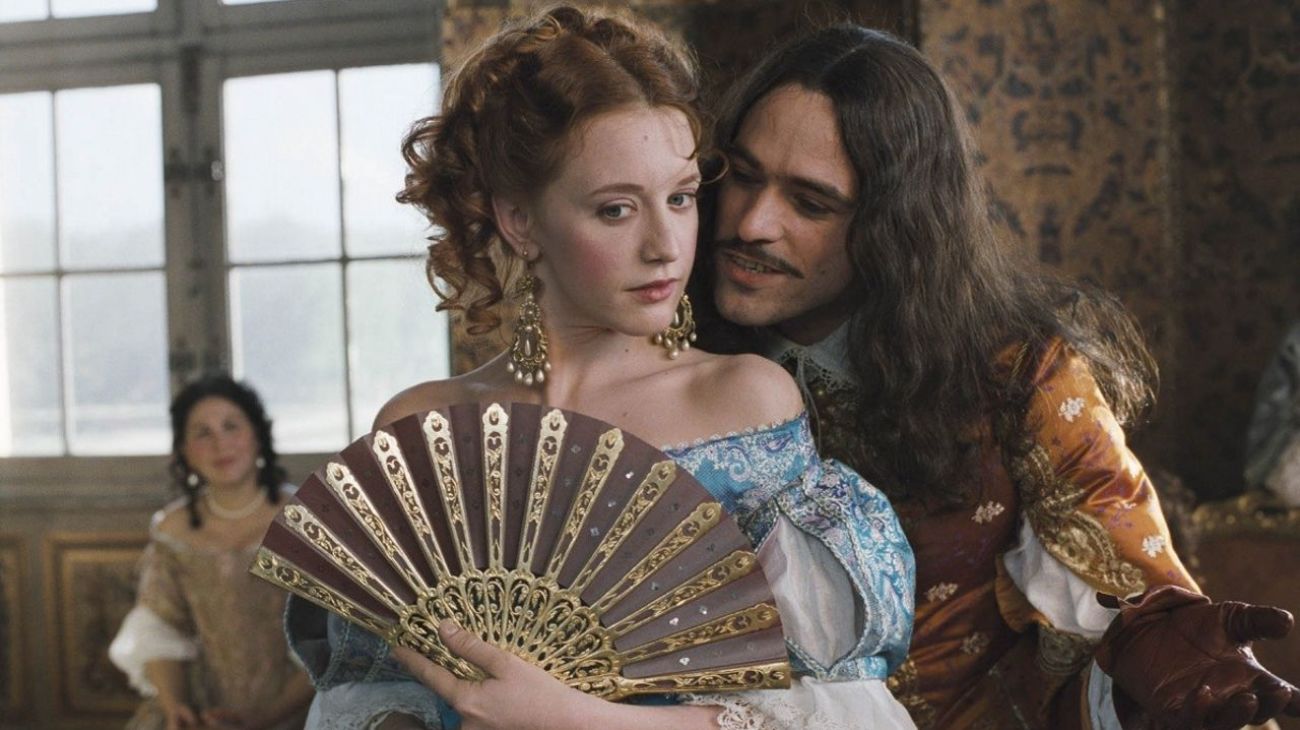
Hey, it's just like Shakespeare in Love, but with Tartuffe!
I don't mind admitting, being an American makes Molière seem better than it actually is, for two reasons: first, most of us haven't read any of Jean-Baptiste "Molière" Poquelin's plays, or at most just The Misanthrope (I do not exempt myself), and second, the film is in French. Let's be honest, foreign-language movies tend to get a free pass: it's a lot easier to forgive strained dialogue if it's in subtitles, and who can really tell how good or bad the performances are, anyway?
That said, I don't believe anybody exists who could watch Molière and think to themselves, "that was a fine work of cinema, was that."
I don't know Tartuffe so I'm not sure how much of what follows is from the play (although I assume it's somewhere between Becoming Jane, "tell the exact same story only about the author" and Shakespeare in Love, "there was this blonde chick while he was writing Romeo and Juliet"): in 1645, Jean-Baptiste Poquelin (Romain Duris), stage name "Molière," gets hisself into some terrible financial trouble, threatening the closure of his theater. Help comes in the form of M Jourdain (Fabrice Luchini), an eccentric and very rich businessman, who offers to pay the actor's debt in exchange for acting lessons, all the better to impress a wealthy, intellectual widow (the frighteningly pretty Ludivine Sagnier). In order to keep this plot secret from Mme Jourdain (Laura Morante), Molière disguises himself as a clergyman named Tartuffe, falls in love with his patron's wife, and extremely traditional farce ensues.
It's all reasonably amusing, but in that very intellectualized sense of "funny," where you're not laughing out loud so much as nodding at the goings-on and thinking, "this situation is amusingly convoluted. It brings good humor to me." In which respect it's a fairly honest adaptation of Molière, really. Director Laurent Tirard is a profoundly unimaginative man, and there's not a single moment that you haven't already seen in a different, better period film, but at least the energy remains high, compared to something as lugubrious as e.g. Becoming Jane. That one is a farce and one is a romance probably has something to do with that.
I also wonder if that goes at least part of the way to explaining how entirely false the story is. It's not just that, like Shakespeare in Love, it tells a story without any historic basis, it gets some very specific facts completely wrong, chief among them being that Tartuffe premiered in 1664, and not 1658 as the movie suggests.
It is, though, at least a little bit invested in the creative impulse, and the ways that life experiences drive art. Unlike Becoming Jane, which really has no goal in mind other than leeching off of the audience's affection for the source material, Molière makes a good faith effort to demonstrate how Poquelin's desire for artistic fame reflects upon the details of his life. As to the question, "is that effort successful," well no, it really isn't. The film is very much just a farce, when all is said and done, and a very mannered farce. It makes one of the great comic authors of all time a wee bit boring, to be completely honest, and that's a curious sort of success that I think we'd all much rather be without, n'est-ce pas?
That said, I don't believe anybody exists who could watch Molière and think to themselves, "that was a fine work of cinema, was that."
I don't know Tartuffe so I'm not sure how much of what follows is from the play (although I assume it's somewhere between Becoming Jane, "tell the exact same story only about the author" and Shakespeare in Love, "there was this blonde chick while he was writing Romeo and Juliet"): in 1645, Jean-Baptiste Poquelin (Romain Duris), stage name "Molière," gets hisself into some terrible financial trouble, threatening the closure of his theater. Help comes in the form of M Jourdain (Fabrice Luchini), an eccentric and very rich businessman, who offers to pay the actor's debt in exchange for acting lessons, all the better to impress a wealthy, intellectual widow (the frighteningly pretty Ludivine Sagnier). In order to keep this plot secret from Mme Jourdain (Laura Morante), Molière disguises himself as a clergyman named Tartuffe, falls in love with his patron's wife, and extremely traditional farce ensues.
It's all reasonably amusing, but in that very intellectualized sense of "funny," where you're not laughing out loud so much as nodding at the goings-on and thinking, "this situation is amusingly convoluted. It brings good humor to me." In which respect it's a fairly honest adaptation of Molière, really. Director Laurent Tirard is a profoundly unimaginative man, and there's not a single moment that you haven't already seen in a different, better period film, but at least the energy remains high, compared to something as lugubrious as e.g. Becoming Jane. That one is a farce and one is a romance probably has something to do with that.
I also wonder if that goes at least part of the way to explaining how entirely false the story is. It's not just that, like Shakespeare in Love, it tells a story without any historic basis, it gets some very specific facts completely wrong, chief among them being that Tartuffe premiered in 1664, and not 1658 as the movie suggests.
It is, though, at least a little bit invested in the creative impulse, and the ways that life experiences drive art. Unlike Becoming Jane, which really has no goal in mind other than leeching off of the audience's affection for the source material, Molière makes a good faith effort to demonstrate how Poquelin's desire for artistic fame reflects upon the details of his life. As to the question, "is that effort successful," well no, it really isn't. The film is very much just a farce, when all is said and done, and a very mannered farce. It makes one of the great comic authors of all time a wee bit boring, to be completely honest, and that's a curious sort of success that I think we'd all much rather be without, n'est-ce pas?
Categories: costume dramas, farce, french cinema, the dread biopic






